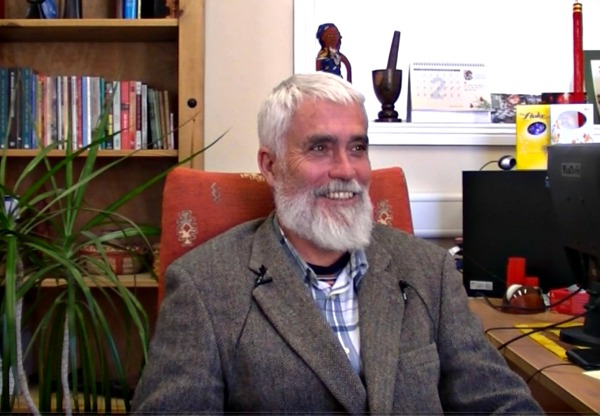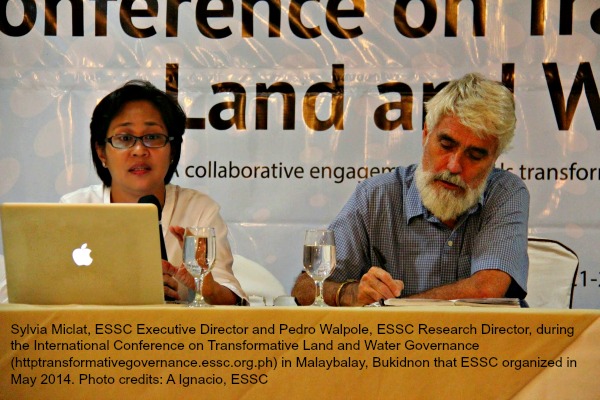
In an interview with Fr Peter Walpole SJ during his recent visit to Ireland, the Irish Jesuit Missions hears of his work and his hopes for the future for young people. He comments on Pope Francis’ stance on climate justice.
Down by the river
Walking by the Dodder River in Dublin, Peter sees the flowing of life…families…old people walking their dogs…he feels that Irish people know how to enjoy the simple things of life and appreciate their relationship with nature. That has not been lost in Ireland. He reflects on the importance of keeping that space in our week where there is time in the economy of things for gratitude and compassion, not just for the self. Youth must learn to see the value of things, then the value of the self will flow along naturally.
Peter has lived all of his life in environments where people value the landscape. He grew up in County Limerick, Ballinacurra: “the Town of the Swamp”, and spent much of his youth by the river. Inspired by the Jesuits there who had great energy and enthusiasm to see the world, he left at 17 and worked in London Zoo. Off then on an adventure measuring glaciers in the Arctic! But a search for warmer climes brought him to Malaysia where he lived on Mount Kinabalu for some time.
Amidst the wonderful ecology, he began to see peoples’ difficulties in relation to the land and seas and it was in the Philippines where Peter became involved with the Society of Jesus. He laughs when he recalls: “I’m not a missionary, nobody sent me! I just appeared and have lived a lovely, happy life there for over 30 years.” Peter’s work falls into two areas:community engagement in the flood plains and the education of youth.
Youth and hope in abundance
Today’s youth is challenged by uncertainty. When Peter worked with young Japanese men and women, he found they were deeply concerned by work insecurity, lack of identity and self worth. They are highly proficient technically but not so in personal relationships. Their lives are very calibrated: they are not experiencing the fullness of life.
In contrast, the Filipino youth he works with are not included in the global economy yet experience the same uncertainty for the future. Yet youth and hope abound around him in the valley where Peter lives. The youth he works with want to make changes. They number about 2000 and his wish for them is to have opportunity and hope while they are seeking to find creative ways of living in relation to the land.
Their desire to return to education has led Peter to organise learning programmes based on caring for the land. They are living in one of the last forests in the world — with a cloud forest above them — very rich in biodiversity. The landscape and culture of the people share a reciprocal relationship. They struggled for nearly 30 years to get land rights and finally succeeded (with help from Misean Cara, Ireland’s overseas aid for missionary organisations). Building management capacity is the next step as the people train to farm to feed themselves and stabilise their lifestyles in an effort to offset the disruptive movement of large scale commercial farming.
At the same time, rural youth there see the value in connecting with urban dwellers and local government so their concerns can be addressed. The young people want to dialogue with the modern world that consumes so much and are aware that they have their own fresh water and sources of energy. They are trying to keep a quality of life, with a balanced consumption and lifestyle security.
A forest hydrologist by profession, Peter’s second area of work is down in the valleys of the flood plains. People living by water are in a detrimental position as constant disasters occur in the Philippines. Community work involves working out strategies for evacuation and relocation.

A new sense of mission
Science has unveiled the whole cosmos from its beginnings. Peter talks of “Cosmovision” because none of the English words we use can describe the fullness of meaning: ecology, nature, the environment all have limitations in their meanings. Cosmovision allows us to place ourselves with a degree of humility in the steering seat of this planet, spinning around in the entire universe. Part of the cosmic vision is compassion, is ecology, is nature and the challenges it faces. For all the science we do, we need the values to live it out, putting science and religion together.
Peter admits: “My generation hasn’t done a good job, we have to hand over responsibility humbly to the next generation who must have the strength and vision to pick it up. It’s going to take 30 years to turn around existing problems and in the Philippines we are already adapting to the problems. We have to lay the process out; set up a new economy. But not in the way it is where the few have so much and the many do not.”
“We have a minimum basic wage but not a minimum maximum wage!”
Pope Francis can be a point of conversion
Climate change is the accumulative patterns of weather systems that shift over time. But Peter warns, we are now moving into bigger shifts. There are changes on land and seas that are interacting with each other over which we have influence and in a sense, we have control. We are in control, but we are actually out of control.
Pope Francis brings a whole other dynamic into climate change concerns. A smart man on the job, he is watching for opportunities. Francis supports new networks and alliances and can be a point of conversion for many regarding climate change. When he visited the Philippines last year, he spoke from the heart and people responded to that. Knowledge is not wisdom; we can only solve problems through the heart.
Peter invites us to take up the challenge of holding a Cosmovision:”I’d like to call everyone to a new sense of mission. A mission that is creative and that cares for creation. This planet is the only one we know, the only vision we have and we must ensure it sustains life for all. This planet is a home to all life, not just our human life.” he concludes.
{youtube}xVR6UkaMXo0{/youtube}
Interview with Fr Peter Walpole SJ, Director of Research at the Institute of Environmental Science for Social Change in the Philippines and Coordinator of Reconciliation with Creation for the Jesuit Conference Asia Pacific.
April 2015

